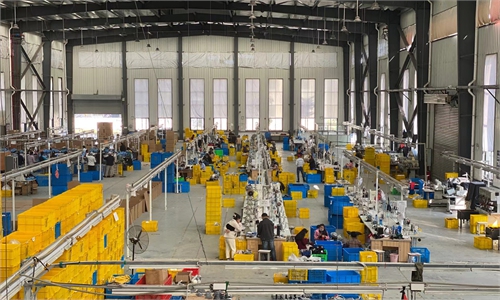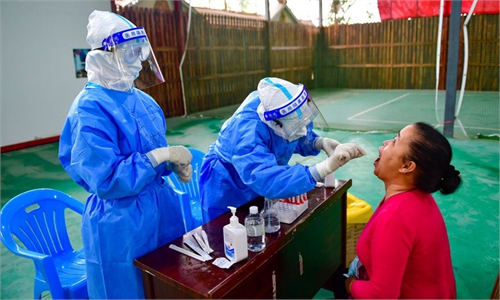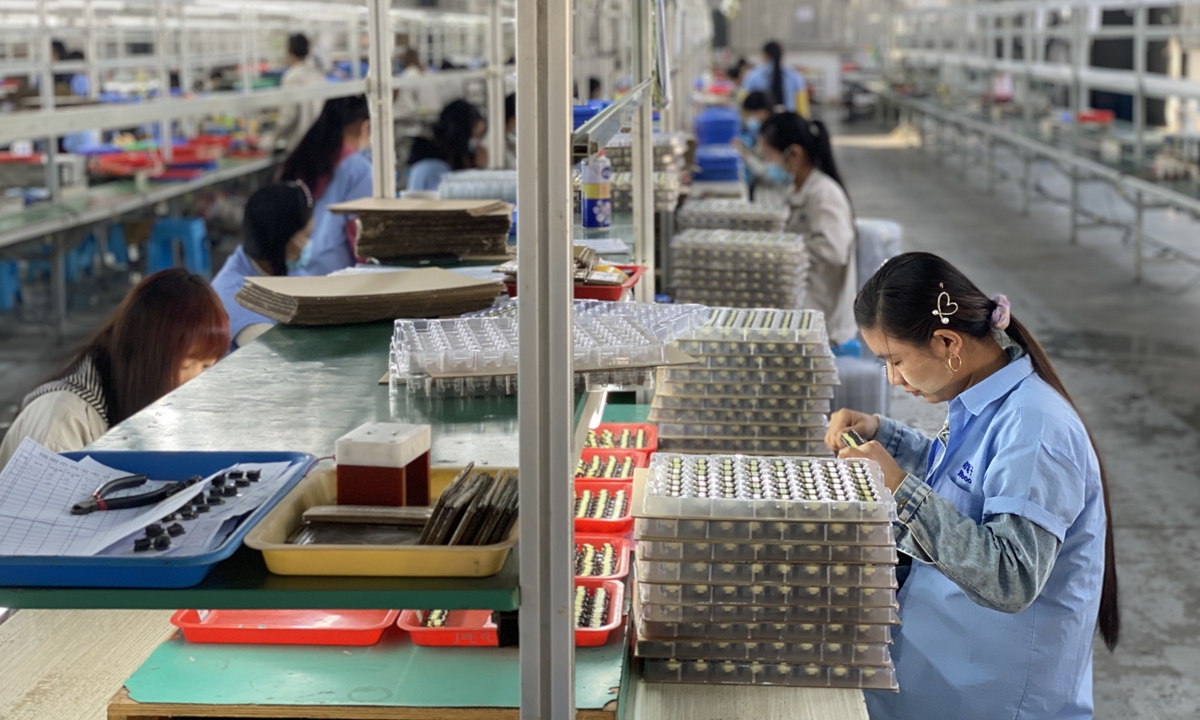
Employees are busy completing orders at an electronics component manufacturer at the Import and Export Processing and Manufacturing Base of the Ruili Industrial Park on January 10, 2023. Photo: Li Qiaoyi/GT
Late on Monday night, a jewelry livestreaming center was ablaze with lights and filled with the hubbub of peddling and negotiations. The scene was an impressive sign of an early post-pandemic recovery in the border city of Ruili in Southwest China's Yunnan Province.
The impression got deeper on Tuesday as Global Times reporters visited multiple sectors of the local economy. Optimism is spreading among the local business community, including jewelry retailers, duty-free operators and manufacturers following the government's decision to reopen the borders from Sunday.
Home to the largest land port on the China-Myanmar border, Ruili made headlines over the past three years for being one of the hardest-hit localities in the country. As measures to improve the country's COVID-19 response came into effect, past uncertainties associated with the virus seemed to be fading.
Some of the city's specialty industries, notably the famed jade jewelry business, were faring better than many could have expected, probably due to the popularity of mobile commerce.
Against the background of feisty livestreamers and dealers alongside rows of jade jewelry stalls, Cai Xin, an executive at the Yangyanghao jewelry livestreaming base, one of the largest of its kind in Ruili, said that some 170 out of 200-plus jade vendors who had previously settled in the base had resumed operations.
The livestreaming base is logging daily sales of more than 10 million yuan ($1.47 million), Cai told the Global Times.
The comeback was much quicker than Cai had expected, and he reckoned the local jade jewelry business is on track to normalcy in a few months.
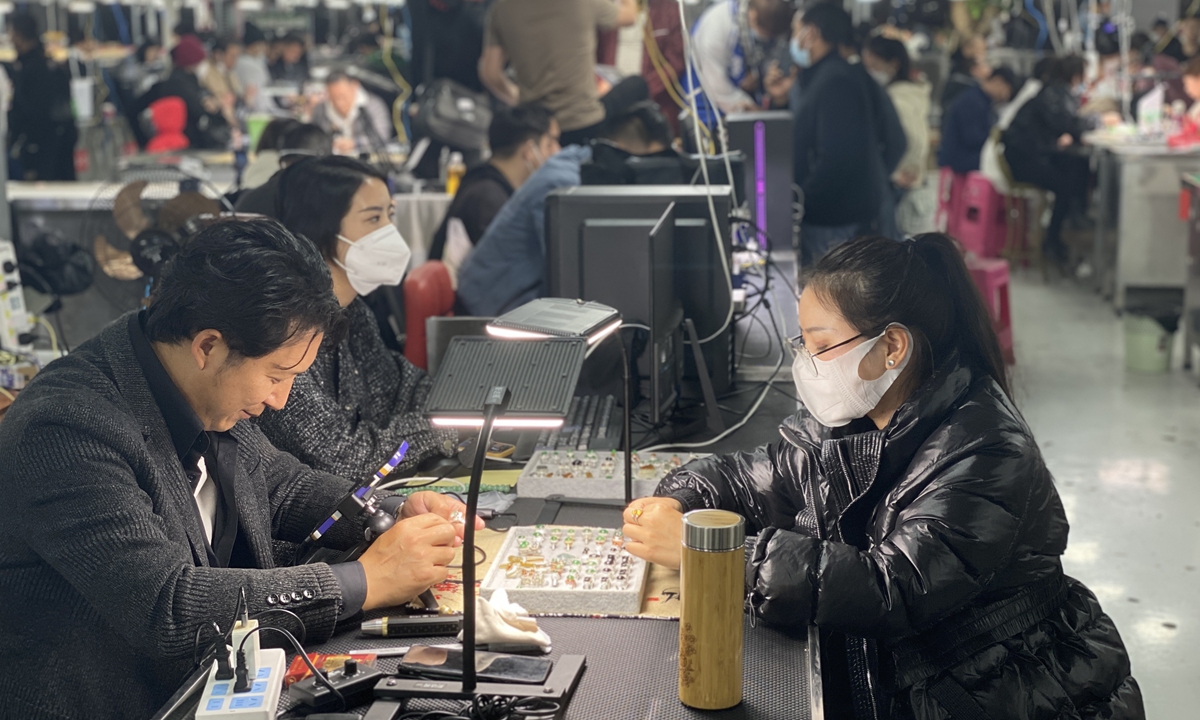
Livestreamers pack a major jade jewelry livestreaming center in Ruili on January 9, 2023. Photo: Li Qiaoyi/GT
The livestreaming base, set up in 2018, is being remodeled from purely selling crude jade stones into a wider mix that includes finished jade products. The current presence with more than 200 tenants is part of the remodeling, which is scheduled to complete by year-end and generate sales of 5-6 billion yuan per year, Cai said. Livestreaming generates roughly 80-90 percent of jade sales now, he said.
Imports of jade and rubies from Myanmar took a hit from the pandemic, weighing on supplies of jade products at large, Zin Myo Thu, a Myanmar jade dealer, told the Global Times. Born in Ruili, Zin Myo Thu inherited his father's jade business acumen when he was just a child, and he speaks fluent Chinese.
Virus-inflicted disruptions to jade imports are set to ease along with the border reopening, he said. Adding to this is Chinese consumers' fondness of jade, which is considered auspicious, he added.
In another sign of revival, traditional on-site retail operations in the city have almost fully recovered in terms of the number of vendors. At a major finished jewelry trade market in Ruili, Global Times reporters found that the spacious market was filled with retailers.
Wang Wenbo, general manager of the market, told the Global Times that 95 percent of the jewelry tenants have been present since mid-November, when the central government announced 20 prevention and control measures to optimize the COVID-19 response.
The market's daily sales now hit 3-5 million yuan, below the peak level of 8 million yuan, Wang disclosed. A return to pre-virus prosperity can be expected in March.
Duty-free shops, another specialty sector in Ruili, are also witnessing a business rebounding.

Customers at a newly opened duty-free shop in Ruili on January 10, 2023. Photo: Li Qiaoyi/GT
Some customers were seen buying cosmetics at a major duty-free outlet near Ruili's Jiegao Border Gate on Tuesday. The shop welcomed more than 600 customers on Sunday, the border reopening day, Yu Guomei, a mall manager, said.
Its peak customer flows exceeded 1,000 per day before the pandemic struck. The shop now offers its heftiest discounts on record, with prices as low as 70 percent off. Roughly 30 percent of its customers are Chinese Myanmar, according to Yu.
On Sunday, a new duty-free outlet opened in Ruili. Within three days, the outlet raked in several million yuan in sales, Chen Feng, deputy general manager of the outlet, told the Global Times on Tuesday. The outlet plans to set a sales goal of 100 million yuan this year, he said. It's pinning its growth hopes on a broad-based revival in consumption this year.
In another sign of accelerating activity, inside the Import and Export Processing and Manufacturing Base of the Ruili Industrial Park, a dozen kilometers away from downtown Ruili, Myanmar workers, accounting for 80 percent of the base's workforce, were seen busy on assembly lines on Tuesday.
Over the past three years, the base, a main manufacturing hub in Ruili, has kept operating, as workers and management, plying between the factories and dormitories that are only a five-minute walk apart, remained in work mode.
Chen Xile, general manager of Mianguang Hat Industry (Ruili) Co, told the Global Times on Tuesday that his company offered employees 500 yuan a month as virus subsidies to retain them.
Chen is one of the local businesspeople who pins hope on the border reopening to inject new vitality into local economy.
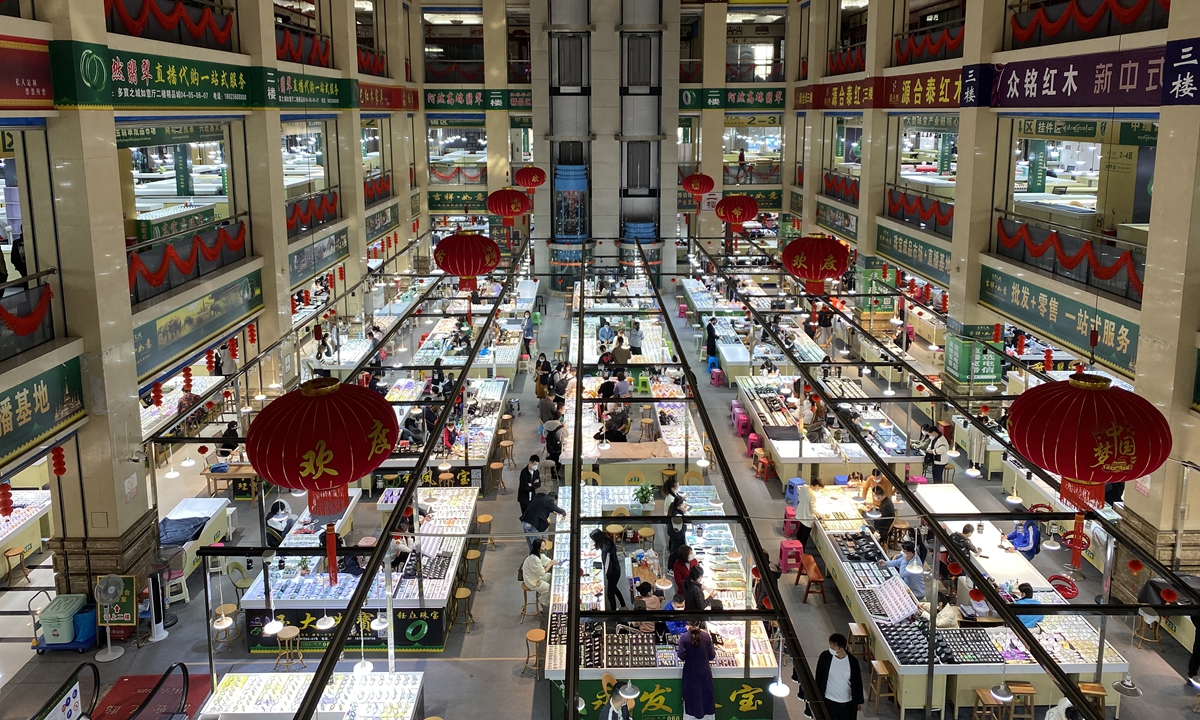
A major jade jewelry market in Ruili on January 10, 2023. Photo: Li Qiaoyi/GT
